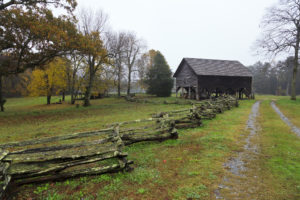Colonists’ support for the American Revolution was strongest in coastal communities that were subject to British taxation on trade. Inland areas of the colonies were more divided in their loyalties.
Rev. Camp was a physician and an Anabaptist minister. Anabaptists in Colonial America were pacifists and rejected ties between the church and ruling political powers. These views were unwelcome in many colonies. Anabaptists were called “Protestant Dissenters” in Virginia where Rev. Camp was born and raised. In Europe and in many of the colonies, Anabaptists were persecuted, even with violence and jail sentences.
In 1769, the Virginia legislature defeated a bill “granting toleration to his majesty’s subjects being Protestant dissenters.” The political battle over the bill worsened mainstream attitudes toward the Anabaptists. Rev. Camp left Virginia with his family and several brothers and migrating south, where he eventually established his ministry at the Buffalo Baptist Church in South Carolina.
An Unusual Battle

From the start of the Revolution, Rev. Camp preached neutrality from the pulpit, but most of those around him, including his brothers, took sides in the war. On October 7, 1780, the largest battle in that area took place on King’s Mountain. The Battle of King’s Mountain was unusual: Although General Cornwallis was not far away, the battle involved almost entirely colonists. The Loyalists were routed. Some of Rev. Camp’s brothers fought with the Patriots; at least one fought with the Loyalists.
Rev. Camp was caught up in the effects of the battle twice. Shortly before hostilities broke out, General Cornwallis, who was trying to locate and engage the Patriot forces, arrested Rev. Camp as a spy. Reportedly, after hours of questioning, it became apparent that Rev. Camp knew little that could be of use to the British, and he was set free.
Love and Compassion Heal the Scars of War
Immediately after the battle, a wounded Patriot, William Bradley, was brought to the Camp home with a dangerous wound to his arm. Rev. Camp, who had served his neighbors for many years as a self-taught physician, examined and dressed the wound. Even such peripheral injuries could be fatal from secondary infection in those times, but Bradley survived. Three years later, Rev. Camp performed the marriage ceremony for Bradley and his betrothed, Aspasia Sprigg.
This tale of William Bradley’s treatment and subsequent marriage by Rev. Camp was recounted in great detail many years later in the 1850 pension application of Aspasia Bradley[1]. She was 95 at the time and stated that she had never before applied for a pension. Her application was approved, retroactive to 1848, for $80 per year. Evidently, many Americans of the 19th century were less informed about their rights under Federal law than they are these days.
© 2013 W. Mullins
